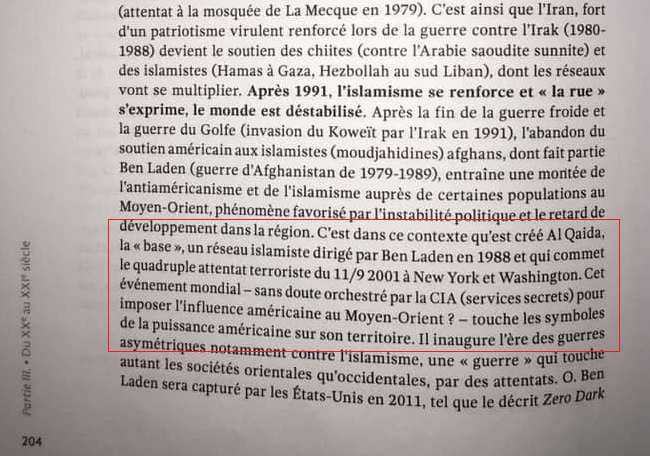JFDee
Senior Member.
Some turmoil recently arose in France when a study manual for "Sciences Po" (political sciences) was found to contain a 9/11 conspiracy reference.

The issue was first published on "Conspiracy Watch" (French)
https://www.conspiracywatch.info/un...a-theorie-du-complot-sur-le-11-septembre.html
An article in "Le Monde" (paid access) was translated to English by the following site (not very well, likely automatic):
http://engnews24h.com/a-pinned-storybook-for-conspiracy/
Excerpt:
The highlighted word is a bogus translation. The original says "sans doute" here which means "without doubt" - contradicting the oddly placed question mark at the end of the insert.
It's not really clear yet if the author had included this passage in his manuscript or if it was slipped in at a later stage.

The issue was first published on "Conspiracy Watch" (French)
https://www.conspiracywatch.info/un...a-theorie-du-complot-sur-le-11-septembre.html
An article in "Le Monde" (paid access) was translated to English by the following site (not very well, likely automatic):
http://engnews24h.com/a-pinned-storybook-for-conspiracy/
Excerpt:
.Arrived in bookstores this winter, the book of synthesis and revisions intended for students of preparatory classes and Sciences Po (a “Manual of circumstances”, as the teachers say) hadn't been talked about much so far. This was without counting the sagacity of history-geography teachers from the Association of Clionautes, relayed by the site Conspiracy Watch, who spotted a passage there “Inadmissible”.
In question, an extract appearing on page 204 of the manual, in a chapter devoted to the conflicts in the Near and Middle East, concerning the attacks of September 11, 2001. “This world event – probably orchestrated by the CIA (secret services) to impose American influence in the Middle East? – touches the symbols of American power on its territory “, can we read there. Even in an interrogative form, the incise “Surreptitiously insinuates” a conspiracy thesis, reacted, Friday, January 17, the Observatory of conspiracy founded by Rudy Reichstadt.
The highlighted word is a bogus translation. The original says "sans doute" here which means "without doubt" - contradicting the oddly placed question mark at the end of the insert.
It's not really clear yet if the author had included this passage in his manuscript or if it was slipped in at a later stage.
